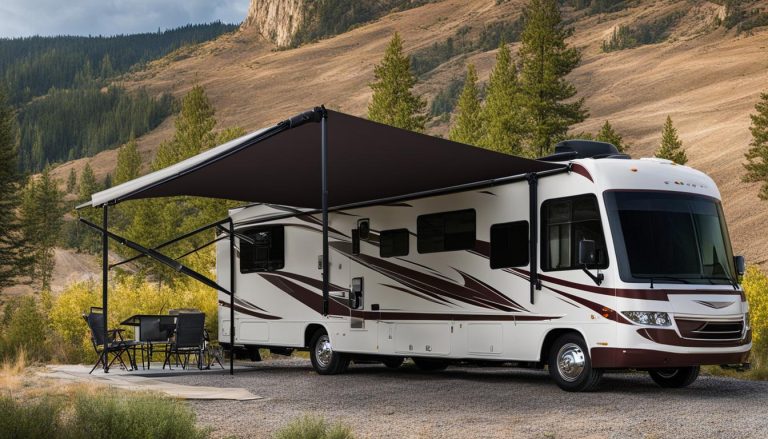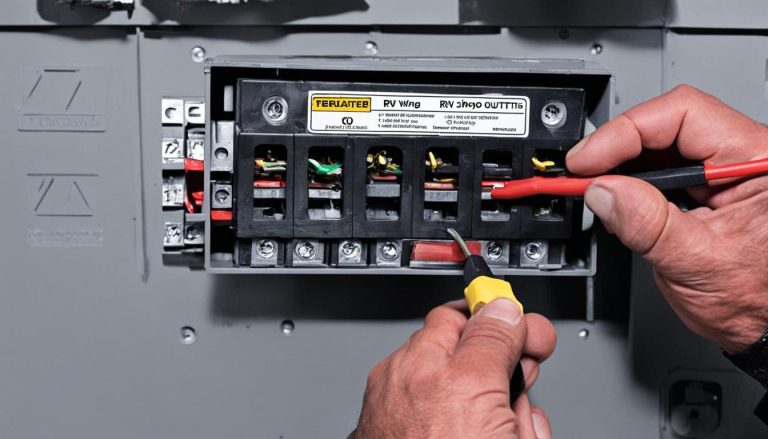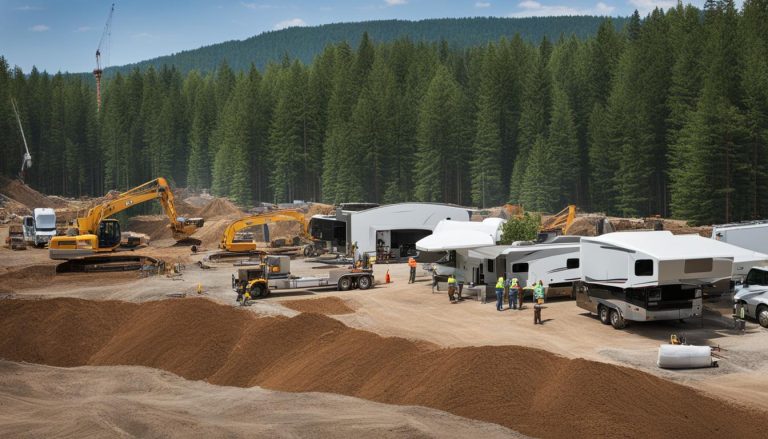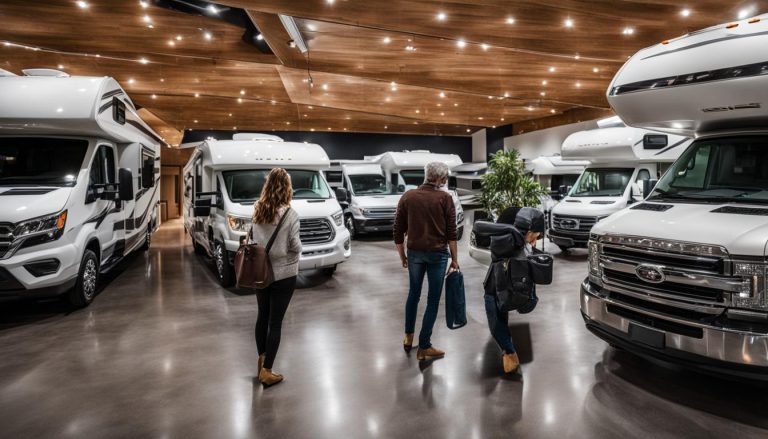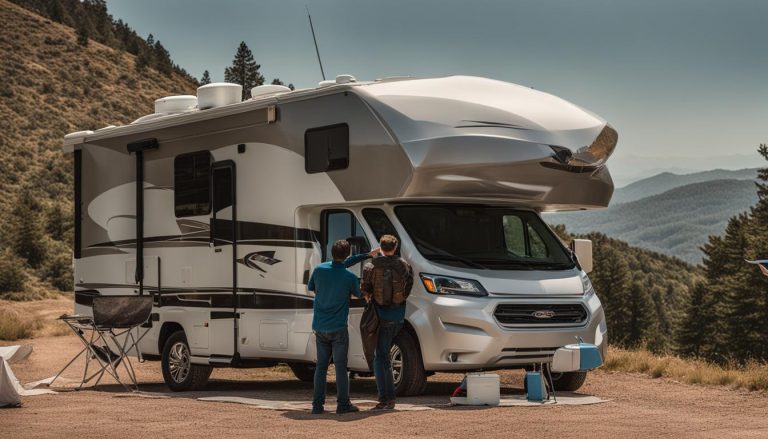Full-Time RV Living Guide – How to RV Full Time
gorvlifestyle.com and its partners may earn a commission if you purchase a product through one of our links
Full-time RV living offers freedom and adventure, but it also comes with challenges and considerations. It requires planning, budgeting, and the right mindset to make the most of this lifestyle. In this guide, we will provide essential tips and insights on how to RV full time, including choosing the right RV, managing costs, finding income on the road, establishing a legal address, and more.
Key Takeaways:
- Choosing the right RV is crucial for full-time living
- Financial planning and budgeting are important for managing costs
- Establishing a legal address is essential for official matters
- Adequate insurance coverage and health considerations are important
- Planning and booking campgrounds requires research and flexibility
Choosing the Right RV for Full-Time Living
When embarking on the journey of full-time RV living, selecting the perfect RV is a crucial decision. The size, layout, and features of your home on wheels can significantly impact your comfort and convenience on the road. Consider the following factors to ensure you choose an RV that aligns with your desired lifestyle:
Assessing your Needs
Start by evaluating your personal needs and preferences. Think about the number of occupants, the amount of storage space required, and the amenities you consider essential for your daily life. A thorough understanding of what you need will help you make an informed decision.
Space and Layout
One of the main considerations is the size of the RV. Larger RVs offer more living space, which can be beneficial if you appreciate roominess or travel with a family. However, keep in mind that larger RVs can be more challenging to maneuver and may have restrictions at certain campsites. Smaller RVs, on the other hand, offer enhanced maneuverability and accessibility to a wider range of campsites. It’s essential to find the right balance that suits your travel style and comfort requirements.
Storage Capacity
Ample storage is crucial for full-time RV living. Consider the amount of storage space available for your belongings, including clothes, kitchen supplies, outdoor equipment, and other essentials. Staying organized in a limited space is key to a stress-free RV lifestyle.
Appliance Features
Take into account the appliances and amenities included in the RV. Determine which features are essential for your comfort and convenience. Consider factors such as cooking facilities, heating and cooling systems, bathroom amenities, and entertainment options. Make sure the RV meets your expectations in terms of functionality and comfort.
Tank Sizes and Off-Grid Capability
If you plan to spend a significant amount of time off-grid or in areas without hookups, consider the tank sizes of your RV. Larger fresh water, gray water, and black water tanks will allow you to extend your stay without worrying about running out of essential resources.
Overall Comfort
Lastly, prioritize your comfort. Spend time inside the RV, sit on the furniture, and envision yourself living and moving around in it. Check the quality of the bed, seating, and other essentials that will contribute to your overall well-being during your full-time RV adventure.
| RV Size | Pros | Cons |
|---|---|---|
| Large RV | Spacious living area More storage options Can accommodate more occupants |
Difficult to maneuver Challenging to find campsites for larger rigs |
| Small RV | Easy to maneuver Access to more campsites Lower fuel consumption |
Limited living space Less storage capacity |
Remember, choosing the right RV is a personal decision that should align with your lifestyle, preferences, and budget. Take the time to research different RV models, visit dealerships, and ask experienced full-time RVers for recommendations. Investing in the right RV will set the foundation for an enjoyable and fulfilling full-time RV living experience.
Financial Considerations for Full-Time RV Living
Living in an RV full time involves careful financial planning and budgeting. As you embark on your RV life adventure, it’s important to consider the various expenses that come with this lifestyle.
1. Campsite Fees
One of the major costs of full-time RV living is campsite fees. The prices can range from as low as $10 per night for basic amenities to $50 or more for sites with full hookups and additional amenities. Research different campsites and plan your budget accordingly.
2. Fuel and Vehicle Expenses
Driving an RV requires fuel, which can be a substantial expense. Calculate the average mileage of your RV and estimate your fuel costs based on your travel plans and distance. Additionally, factor in vehicle insurance, registration, and maintenance costs to ensure you have a comprehensive understanding of your vehicle expenses.
3. RV Payments and Repairs
If you have purchased an RV, consider your monthly payments and the potential cost of repairs. It’s important to set aside funds for unexpected maintenance and repairs that may arise while on the road.
4. Groceries and Daily Expenses
Like any household, you’ll need to budget for groceries and daily expenses. Plan your meals and shop strategically to make the most of your budget. Consider cooking meals in your RV rather than eating out to save money.
5. Creating a Budget
To manage your finances effectively, create a monthly budget that includes all your expected expenses. Track your spending to ensure you’re staying within your budget and identify areas where you can cut costs or make adjustments.
6. Alternative Camping Options
Consider alternative camping options such as boondocking, which involves camping without hookups on public lands or in designated areas. Boondocking can help reduce campsite fees and is an excellent way to experience nature and enjoy solitude.
7. Finding Income Opportunities
If you need a source of income while on the road, explore remote work opportunities or short-term jobs that allow you the flexibility to travel while earning money. Many full-time RVers find ways to generate income through freelancing, consulting, or starting an online business.
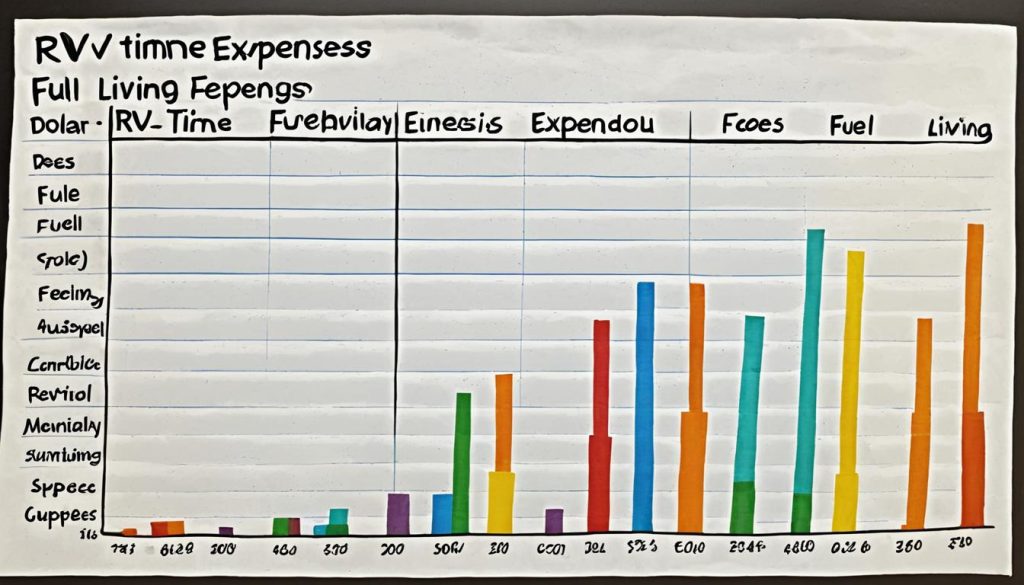
By budgeting wisely and exploring various income opportunities, you can manage the financial aspects of full-time RV living and enjoy the freedom and adventure that this lifestyle offers.
Establishing a Domicile and Address
Even as a full-time RVer, you need a legal address for tax purposes, vehicle registrations, and other official matters. It’s essential to have a consistent address and manage your mail, either through a family member or a mail-forwarding service.
But where can you establish your domicile? When it comes to choosing a domicile as an RV enthusiast, you have a few options:
- Claim domicile using a property you own
- Stay with family or friends who allow you to use their address
- Establish a domicile in a state that caters to full-time RVers, such as Florida, South Dakota, or Texas
Each option has its own benefits and considerations. Establishing a domicile in a state favorable to full-time RVers provides advantages like no state income tax and RV-friendly laws and regulations.
Benefits of Establishing a Domicile in a Full-Time RVer-Friendly State
| State | Tax Benefits | RV-Friendly Laws | Mail Forwarding Options |
|---|---|---|---|
| Florida | No state income tax | 100% homestead exemption for primary residence | Various mail forwarding services available |
| South Dakota | No state income tax | Low vehicle registration fees | Multiple mail forwarding services |
| Texas | No state income tax | No vehicle inspections or emissions tests | Several mail forwarding services to choose from |
When choosing a domicile state, consider factors like tax benefits, RV-friendly laws, and available mail forwarding options. Additionally, ensure that you research and comply with the specific requirements of the state you choose.
By establishing a domicile and managing your mail effectively, you can enjoy the freedom and flexibility of full-time RV living while staying compliant with legal and official obligations. So, find the right solution for your situation and hit the road with peace of mind!
Remember:
Even as a full-time RVer, it’s important to have a consistent address for tax purposes, vehicle registrations, and other official matters.
Insurance and Health Considerations
Adequate insurance coverage is essential when living in an RV full time. Ensuring your policy covers full-time RV travel and includes roadside assistance for RV-specific needs is crucial to protect yourself and your investment on the road.
When it comes to health insurance, you have a few options to consider. If you have traditional employment, you may already have coverage through your employer. However, if you are self-employed or your employer doesn’t offer health insurance, it’s important to find a plan that covers you while living in your domicile state.
If you’re traveling with pets, their wellbeing should also be a priority. Make sure their vaccines are up to date and that your insurance policy covers them in case of any unexpected veterinary expenses.
Insurance provides peace of mind and protection for you and your loved ones while living the full-time RV lifestyle.
Insurance Coverage Tips:
- Verify that your insurance policy covers full-time RV travel.
- Ensure your policy includes roadside assistance for RV-specific needs, such as towing your RV in case of a breakdown.
- Consider comprehensive coverage to protect your RV from theft, accidents, and natural disasters.
Health Insurance Tips:
- If you have traditional employment, check if your health insurance covers you while living in your RV.
- Explore health insurance options that offer coverage in your domicile state.
- Consider health insurance plans that provide nationwide coverage to ensure you’re protected while traveling.
It’s important to review and update your insurance policies regularly to ensure they meet your evolving needs as a full-time RVer.
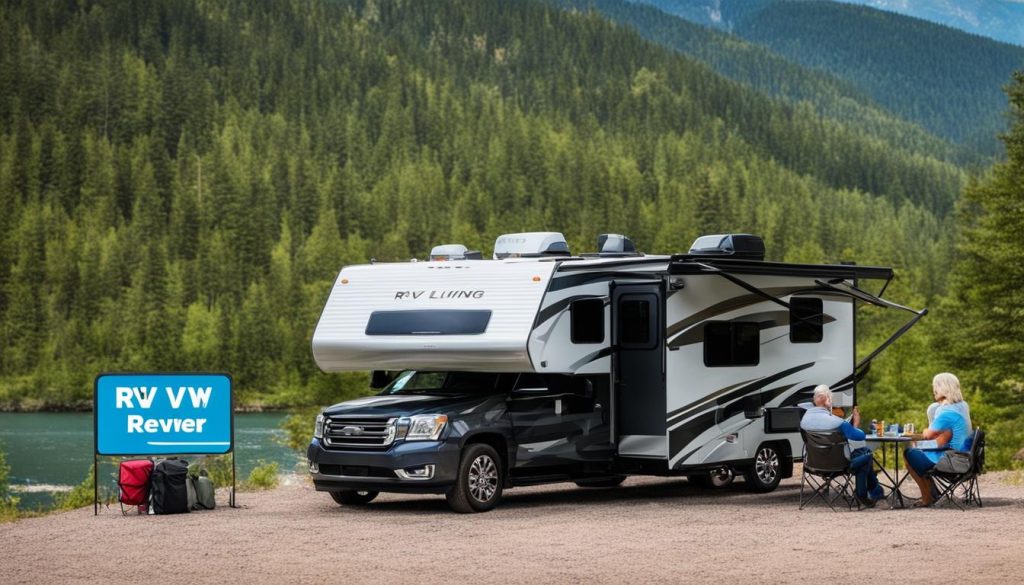
Planning and Booking Campgrounds
When it comes to full-time RV living, careful planning and booking of campgrounds are essential for a smooth and enjoyable journey. Whether you prefer private RV parks, public campgrounds, or public lands, each type offers different amenities, cost ranges, and availability. To ensure you secure your desired campsites, consider factors such as weather conditions, tourist seasons, and peak months, as popular campgrounds can fill up quickly. Here are some useful tips to help you plan and book your campgrounds:
1. Research Campground Options
Begin your planning process by researching various campgrounds along your route. Look for campgrounds that meet your specific needs and preferences, such as proximity to attractions, pet-friendly amenities, or access to hiking trails. Consider using campground directories, online reviews, and RVing communities to gather information and insights from fellow travelers.
2. Make Reservations in Advance
Once you have narrowed down your choices, it’s important to make reservations in advance, especially for popular campgrounds and peak seasons. Many campgrounds allow booking several months in advance, so take advantage of this to secure your preferred dates and sites. Keep in mind that some campgrounds may have different reservation policies, such as requiring a minimum stay or specific check-in times.
3. Stay Flexible with Travel Dates
Flexibility with your travel dates can greatly increase your chances of securing campsites in high-demand areas. Consider adjusting your travel plans by a day or two to accommodate campground availability. With a bit of flexibility, you can explore popular destinations without the stress of last-minute campsite hunting.
4. Join RV Memberships and Clubs
Consider joining RV memberships and clubs, such as Good Sam Club or Passport America, to access discounts and benefits for campground reservations. These memberships can help you save money and provide additional perks, such as extended stays or access to exclusive campgrounds. Take a look at the benefits offered by different memberships and choose the ones that align with your travel preferences.
5. Have Backup Campground Options
Despite careful planning, there may be instances where your preferred campground is fully booked. It’s always a good idea to have backup options in case of unavailability. Create a list of alternative campgrounds along your route and keep their contact information handy. This way, you can easily pivot to another campground without too much disruption to your travel plans.
By following these tips, you can navigate the planning and booking process with ease, ensuring that you secure the perfect campsites for your full-time RV adventure. Happy travels!
Embracing the Full-Time RV Lifestyle
Full-time RV living offers unique opportunities for adventure, travel, and personal growth. Embrace the freedom of the open road and make the most of your travel experiences. Create a bucket list of places to visit, explore outdoor activities and national parks, and try new experiences outside your comfort zone. However, remember that full-time RVing is not a continuous vacation but a way of life that requires proper planning, resource management, and adaptation to new environments.
Living the RV lifestyle allows you to break free from the confines of traditional housing and experience a more nomadic and fulfilling existence. The benefits of this lifestyle are numerous:
- Flexibility: Unlike a stationary home, an RV provides the freedom to change your surroundings whenever you desire. You have the power to wake up to a new view every day.
- Cost savings: RV living can be significantly more affordable than maintaining a traditional home. You can save on mortgage or rent payments, property taxes, and utility bills.
- Minimalism: Living in an RV requires you to downsize and prioritize the essentials. You’ll learn to appreciate the simplicity of a clutter-free lifestyle.
- Connection with nature: RV living allows you to immerse yourself in the beauty of nature. Park your RV in stunning landscapes, campgrounds, and national parks, waking up to serene surroundings.
- Community: The RV community is vast and welcoming. You’ll have the opportunity to meet like-minded individuals and build strong connections with fellow RVers.
To fully embrace the RV lifestyle, it’s important to appreciate the benefits it brings to your life. Take advantage of the freedom, flexibility, and cost savings that this way of living offers. Explore new destinations, connect with nature, and build lasting memories on the road.
“The open road calls to those seeking adventure and a break from the ordinary. RV living provides the opportunity to shape your own journey, explore the unknown, and discover the world from a unique perspective.”
Discovering New Destinations
As a full-time RVer, you have the privilege of exploring a vast array of destinations. From remote campgrounds nestled in breathtaking landscapes to vibrant cities bursting with life, the possibilities are endless. Take the time to research and plan your route, ensuring that you visit the must-see locations and hidden gems along the way. National parks, historical landmarks, and scenic drives are just some of the attractions waiting to be discovered.
Connecting with Nature
One of the greatest benefits of RV living is the opportunity to connect with nature on a deeper level. Immerse yourself in the tranquility of national parks, hike scenic trails, admire stunning sunsets, and stargaze under the clear night sky. Experience the magic of waking up to the sounds of birds chirping and the crisp smell of fresh air. Nature has a way of rejuvenating the body, mind, and soul, and living in an RV allows you to experience it firsthand.
Stepping Outside Your Comfort Zone
Living the full-time RV lifestyle presents the perfect chance to step outside your comfort zone and try new experiences. Whether it’s trying out a new outdoor activity like kayaking or rock climbing, or immersing yourself in local culture and cuisine, embrace the unknown and push your boundaries. The reward of personal growth and self-discovery is priceless.
| Benefits of Full-Time RV Living | Description |
|---|---|
| Flexibility | Change your surroundings at will and wake up to a new view every day. |
| Cost savings | Affordable compared to maintaining a traditional home. |
| Minimalism | Downsize and appreciate a clutter-free lifestyle. |
| Connection with nature | Immerse yourself in the beauty of natural surroundings. |
| Community | Build connections with like-minded individuals in the RV community. |
Tips for Success as a Full-Time RVer
To thrive as a full-time RVer, it’s important to stay organized, establish routines, and maintain a positive mindset. Living in an RV full time offers endless possibilities for exploration and adventure, but it also requires careful planning and adaptability.
Start by learning from experienced full-time RVers who can share valuable insights and tips. They can provide guidance on important topics such as RV maintenance, remote work opportunities, and community building. Their wisdom and experience can help you navigate the challenges and make the most of your full-time RV lifestyle.
While full-time RV living offers the freedom to go wherever you please, it’s important to stay connected with loved ones. Utilize technology to stay in touch with family and friends, and plan visits with them along your journey. These connections will provide a sense of community and support as you embark on this exciting adventure.
As a full-time RVer, finding the right balance between planning and spontaneity is key. Have a general travel itinerary in mind, but be open to new opportunities and unexpected detours. Embrace the flexibility that comes with this lifestyle, and be prepared to adapt to unforeseen circumstances along the way.
With the right mindset and preparation, living in an RV full time can be a rewarding and fulfilling lifestyle choice. Stay organized, establish routines, seek advice from experienced RVers, stay connected with loved ones, and maintain a positive attitude. By doing so, you’ll be well on your way to experiencing the joys and freedom of full-time RV living.
FAQ
How do I choose the right RV for full-time living?
Consider factors such as space requirements, storage capacity, appliance features, tank sizes, and overall comfort. Assess your needs, the number of occupants, and your preferred style of travel to choose the best RV for your full-time adventure.
What are the financial considerations for full-time RV living?
Full-time RV living involves expenses such as campsite fees, fuel, RV and vehicle payments, maintenance, repairs, groceries, and daily expenses. Create a budget, track your spending, and consider alternative camping options and income generation on the road to control costs.
How do I establish a domicile and address while living in an RV full time?
You can claim domicile at a property you own, stay with family or friends who allow you to use their address, or establish a domicile in a state that caters to full-time RVers. It’s important to have a consistent address and manage your mail, either through a family member or a mail-forwarding service.
What insurance and health considerations should I keep in mind as a full-time RVer?
Ensure your insurance policy covers full-time RV travel and includes roadside assistance for RV-specific needs. Consider health insurance options that cover you in your domicile state. Update your pet’s vaccines and ensure your insurance covers them as well.
How should I plan and book campgrounds for full-time RV living?
Depending on the campground type, amenities, cost ranges, and availability can vary. Consider factors such as weather conditions, tourist seasons, and peak months. Plan ahead, make reservations in advance, and maintain flexibility in your travel dates to secure your desired campsites.
How can I embrace the full-time RV lifestyle?
Create a bucket list of places to visit, explore outdoor activities and national parks, and try new experiences. Embrace the freedom of the open road and make the most of your travel experiences.
What are some tips for success as a full-time RVer?
Stay organized, establish routines, and maintain a positive mindset. Learn from experienced full-time RVers and seek advice on RV maintenance, remote work opportunities, and community building. Stay connected with loved ones and find balance between planning and spontaneity.


